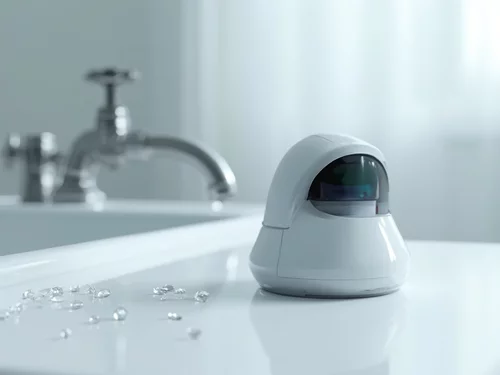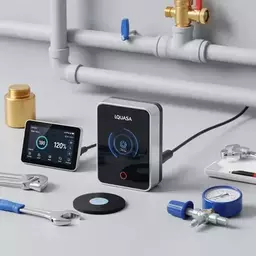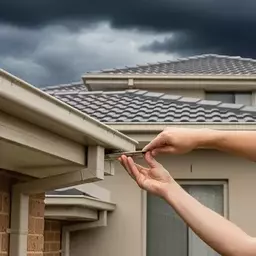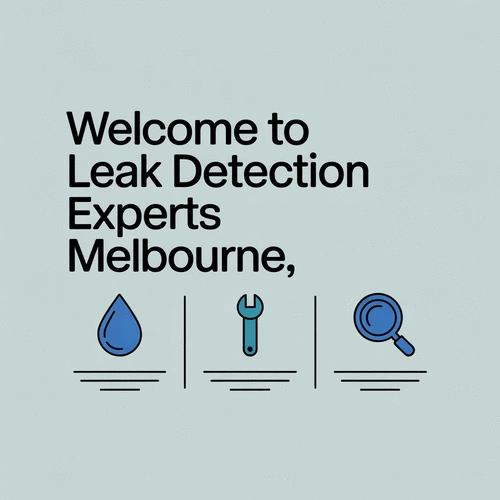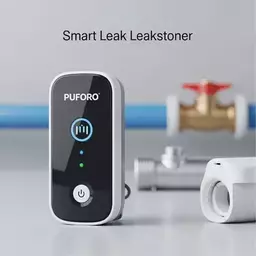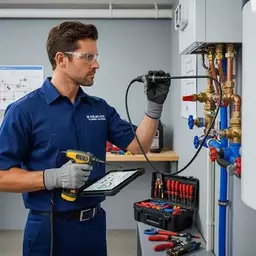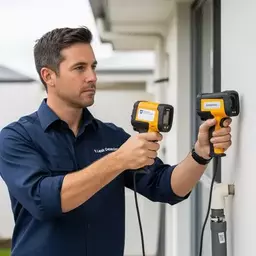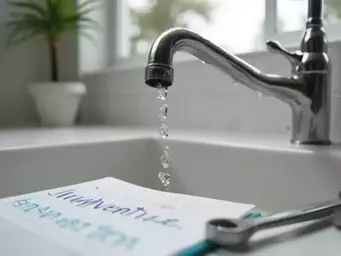As the global water crisis intensifies, innovative technologies are emerging to combat inefficiencies in leak detection. Are you ready to discover how you can protect one of our most vital resources?
What You Will Learn
- By 2025, 20-30% of treated water is projected to be lost, emphasizing the urgent need for effective leak detection.
- Aging infrastructure and climate change are significant contributors to water loss, demanding smarter management solutions.
- Technologies like thermal imaging cameras and smart water meters are revolutionizing leak detection and monitoring.
- Robust cybersecurity measures are essential to protect the integrity of smart water management systems from potential threats.
- Implementing advanced leak detection can lead to substantial savings on water bills and repair costs for homeowners and businesses.
- Real-world case studies demonstrate the tangible benefits of adopting innovative leak detection technologies.
- Future innovations, including AI and blockchain, promise to further enhance the efficiency of water leak detection systems.
The Crisis of Water Loss: 2025 Projections & Solutions
The visual below illustrates the projected water loss in 2025 and the key technological solutions for mitigation and management.
Global Water Loss Projection 2025
20-30%
of treated water lost due to leaks and inefficiencies.
Key Contributing Factors
- Aging infrastructure
- Increased urbanization
- Climate change impacts
- Smarter water management needs
Advanced Leak Detection Technologies
- Thermal imaging cameras
- Acoustic sensors
- Smart water meters
- AI for predictive insights
Quantifiable Savings
- Reduced water bills
- Minimized repair costs
- Increased property value
- ROI through early detection
Security Best Practices
- Regular security audits
- Data encryption
- Access control
- Employee training
The Crisis of Water Loss and Innovative Solutions
Water loss is more than just a nuisance; it’s a growing crisis that affects both homeowners and businesses alike. Did you know that in 2025, global water loss is projected to reach alarming levels? As our demand for water increases, the inefficiencies in our systems become more pronounced. This is where the importance of effective leak detection comes into play. At Leak Detection Experts Melbourne, we are committed to addressing these challenges with innovative solutions tailored to meet our clients' needs.
Understanding the scale of water loss requires an awareness of the factors contributing to it. From aging infrastructure to climate change impacting our water sources, the stakes are high. But with the right approaches, we can mitigate these issues effectively and protect our most precious resource.
Understanding the Scale of Water Loss in 2025
As we look ahead to 2025, reports indicate that approximately 20-30% of treated water is lost due to leaks and inefficiencies. This statistic is a wake-up call for Melbourne homeowners and businesses to take action. Here are some key factors to consider:
- Aging pipes and infrastructure
- Increased urbanization leading to higher demands
- Climate change affecting water availability
- The need for smarter water management systems
Addressing these challenges head-on can transform our water conservation efforts. By investing in advanced leak detection technologies, we can significantly reduce water loss and enhance sustainability.
The Role of Technology in Transforming Leak Detection
Technology is revolutionizing how we detect leaks and manage water resources. As a plumbing expert, I've seen firsthand how innovative tools can make a difference. The implementation of advanced leak detection technologies not only improves accuracy but also minimizes disruption during repairs. Here are some technologies leading the charge:
- Thermal imaging cameras for non-invasive leak detection
- Acoustic sensors to pinpoint leaks in real-time
- Smart water meters that provide constant monitoring
These advancements allow us to act quickly, preventing further damage and costly repairs. At Leak Detection Experts Melbourne, we utilize cutting-edge technology to ensure our clients receive the best service possible.
Exploring Smart Water Meters for Enhanced Monitoring
Smart water meters are becoming essential tools in modern leak detection. By providing real-time data, they enable homeowners and businesses to monitor their water usage more effectively. The benefits of smart meters include:
- Immediate alerts for unusual water consumption
- Detailed usage reports for better budgeting
- Remote access to monitor water flow
These features help you stay ahead of potential leaks before they escalate into major issues. As someone who values customer education, I believe that understanding how these systems work can empower homeowners and businesses alike to take control of their water usage.
Pro Tip
To maximize the effectiveness of your leak detection efforts, consider conducting regular maintenance checks alongside implementing advanced technologies. Regular inspections not only help identify potential leaks early but also ensure your systems remain efficient and cost-effective in the long run!
Addressing Security, Privacy, and Compliance in IoT Systems
As we embrace the digital age, understanding cybersecurity risks in water management becomes crucial. The interconnectedness of smart water systems presents a dual-edged sword: while these technologies enhance efficiency, they also expose systems to potential vulnerabilities. It’s essential to recognize that the very sensors and IoT devices that help us monitor water leaks can become targets for cyber threats if not properly secured.
At Leak Detection Experts Melbourne, we emphasize the importance of robust security measures in our solutions. Implementing advanced security protocols helps safeguard sensitive data and ensures that water management systems operate smoothly and securely. By understanding and mitigating these risks, we can protect not only our clients but also the integrity of the entire water supply chain!
Best Practices for Safe Deployment of Leak Detection Technologies
To ensure a seamless integration of leak detection technologies into existing systems, adopting best practices is vital. Here are some key steps we recommend:
- Regular Security Audits: Conduct periodic reviews of your systems to identify potential vulnerabilities.
- Data Encryption: Utilize strong encryption methods to protect sensitive information during transmission.
- Access Control: Implement strict access protocols to limit who can view or manipulate system data.
- Employee Training: Educate staff about cybersecurity best practices and the importance of safeguarding information.
By following these best practices, businesses can significantly reduce the likelihood of breaches and enhance the overall security of their water management systems. It's not just about prevention; it's about building a culture of security awareness that becomes part of your operational fabric.
Ensuring Data Security in Smart Water Management Systems
The security of data in smart water management systems is paramount. With sensitive information flowing through these platforms, ensuring data integrity and confidentiality is a top priority. Employing multi-layered security approaches is key to achieving this goal.
- Real-Time Monitoring: Use monitoring tools to detect anomalies and potential breaches as they happen.
- Regular Software Updates: Keep all systems updated to protect against known vulnerabilities.
- Incident Response Plans: Develop and maintain a response plan to address potential data breaches quickly and effectively.
At Leak Detection Experts Melbourne, we integrate these security measures into our solutions to give our clients peace of mind. By fostering a secure environment for data handling, we empower homeowners and businesses alike to focus on what truly matters: protecting their properties from the devastating effects of water leaks.
Frequently Asked Questions
Q: What is the projected global water loss for 2025?
A: It is projected that 20-30% of treated water will be lost globally by 2025 due to leaks and inefficiencies.
Q: What are the main factors contributing to water loss?
A: Key factors include aging infrastructure, increased urbanization, and the impacts of climate change, all of which necessitate smarter water management.
Q: What advanced technologies are used for leak detection?
A: Advanced technologies include thermal imaging cameras, acoustic sensors, smart water meters, and AI for predictive insights.
Q: How do smart water meters help in leak detection?
A: Smart water meters provide real-time data, immediate alerts for unusual consumption, detailed usage reports, and remote access to monitor water flow, helping to detect leaks early.
Q: Why is cybersecurity important for smart water management systems?
A: Cybersecurity is crucial to protect against potential vulnerabilities and cyber threats to interconnected smart water systems, ensuring data integrity and operational security.
Q: What are the financial benefits of implementing advanced leak detection?
A: Benefits include reduced water bills, minimized repair costs due to early intervention, increased property value, and a strong return on investment (ROI).
Measuring Success: ROI and Cost-Benefit Analysis
Investing in advanced leak detection solutions isn't just about preventing water loss; it’s also about realizing significant savings and returns on investment (ROI). As a plumbing expert, I've seen firsthand how effective leak detection can save homeowners and businesses a substantial amount of money. Understanding the financial benefits is essential for decision-makers.
At Leak Detection Experts Melbourne, we help our clients analyze these factors to ensure that they can accurately gauge the effectiveness of their investments. With the right approach, advanced leak detection technologies can lead to substantial cost savings over time.
Quantifying Savings from Advanced Leak Detection Solutions
One of the most compelling reasons to adopt advanced leak detection solutions is the quantifiable savings they can generate. Here are a few ways these systems save money:
- Reduced Water Bills: By detecting leaks early, you can significantly lower your monthly water expenses.
- Minimized Repair Costs: Early intervention leads to less extensive damage, which means lower repair costs.
- Increased Property Value: A well-maintained plumbing system enhances your property’s market value.
By presenting these savings, clients can make informed decisions about investing in leak detection technologies. It’s not just a cost; it’s an investment that pays off!
Case Studies Demonstrating Real-World Impacts
Case studies provide concrete evidence of the effectiveness of leak detection technologies. By analyzing real-world examples, we can understand their impact more deeply. Here are a couple of notable instances:
- Residential Case Study: A Melbourne family experienced a 30% decrease in their water bill after implementing a smart leak detection system.
- Commercial Case Study: A local business reduced their water waste by 40%, saving thousands annually by using predictive leak management technologies.
These stories not only highlight the financial benefits but also emphasize the importance of proactive measures in maintaining plumbing systems. They serve as powerful reminders that investing in advanced technologies can lead to remarkable improvements.
Analyzing Customer Testimonials and Market Trends
Customer feedback is invaluable in understanding the effectiveness of leak detection systems. At Leak Detection Experts Melbourne, we regularly gather testimonials from our clients to gauge satisfaction and areas for improvement. Here are some key insights:
- Increased Peace of Mind: Clients appreciate the security of knowing they are protected from potential leaks.
- Enhanced Efficiency: Users find that advanced solutions streamline their water management processes.
- Positive Environmental Impact: Many clients express pride in contributing to water conservation efforts.
Market trends indicate a growing demand for these technologies as awareness of water conservation increases. By staying ahead of these trends and continually refining our offerings, we can ensure that Leak Detection Experts Melbourne remains a trusted partner for both homeowners and businesses!
Looking Ahead: The Future of Water Leak Detection Technologies
The landscape of water leak detection is constantly evolving, with innovations on the horizon that promise even greater efficiency and reliability. As I look into the future, I'm excited about the potential of these technologies to revolutionize how we manage water resources.
Emerging Trends and Innovations on the Horizon
With rapid advancements in technology, several emerging trends are shaping the future of leak detection:
- Increased Use of AI: Artificial intelligence will continue to refine leak detection methods, offering predictive insights that can prevent issues before they arise.
- Integration of Blockchain: Enhancing data security and transparency within the water management sector through blockchain technology.
- Smart Water Grids: Expanding the role of leak detection technology in smart city frameworks to facilitate efficient water use.
These trends are indicative of a more sustainable approach to water management, aligning with the broader goals of conservation and efficiency. At Leak Detection Experts Melbourne, we’re committed to staying at the forefront of these developments!
Preparing for Global Adoption and Regulatory Changes
As these technologies gain momentum, preparing for global adoption and potential regulatory changes will be essential. Stakeholders must collaborate to establish standards that ensure the safe and effective implementation of leak detection systems. It's not just about compliance; it’s about setting a foundation for widespread adoption that benefits everyone.
Exploring Future Innovations in Smart Water Technologies
The future holds exciting possibilities for smart water technologies. Innovations that enhance connectivity, improve user experience, and incorporate sustainable practices will lead the way. As we move forward, I encourage everyone to remain informed and proactive about these advancements. Together, we can create a future where water management is not only efficient but also sustainable!
Summary of Key Takeaways and Actionable Insights
In this rapidly evolving landscape, it’s crucial for homeowners, businesses, and utility providers to stay updated on best practices and innovations in leak detection technology. The key takeaways from this discussion highlight the importance of security, ROI analysis, and future trends. Each of these elements plays a pivotal role in effectively managing water resources.
Guidance for Homeowners, Businesses, and Utility Providers
For those looking to enhance their leak detection strategies, consider implementing advanced technologies with a focus on security and proactive management. Partnering with local experts like Leak Detection Experts Melbourne can provide the insights needed to make informed decisions!
Encouraging Proactive Measures for Water Conservation
Ultimately, the goal is to foster a culture of water conservation through technology and awareness. By taking proactive measures today, we pave the way for a sustainable future. Together, we can ensure that our water resources are managed wisely, reducing waste and preserving this vital resource for generations to come!
Recap of Key Points
Here is a quick recap of the important points discussed in the article:
- In 2025, global water loss is projected to reach alarming levels, with 20-30% of treated water lost due to leaks and inefficiencies.
- Investing in advanced leak detection technologies, such as thermal imaging cameras and smart water meters, can significantly mitigate water loss.
- Implementing robust security measures and regular audits is vital to protect data in smart water management systems.
- Proactive measures, including employee training and access control, enhance the overall security of leak detection solutions.
- Understanding the ROI from leak detection technologies can lead to substantial cost savings, reduced water bills, and increased property value.

